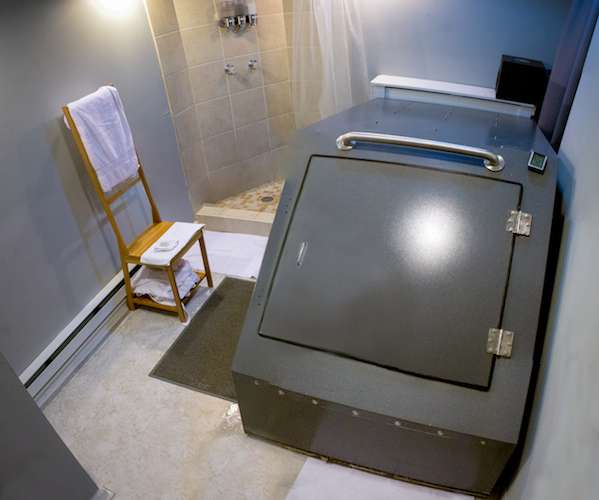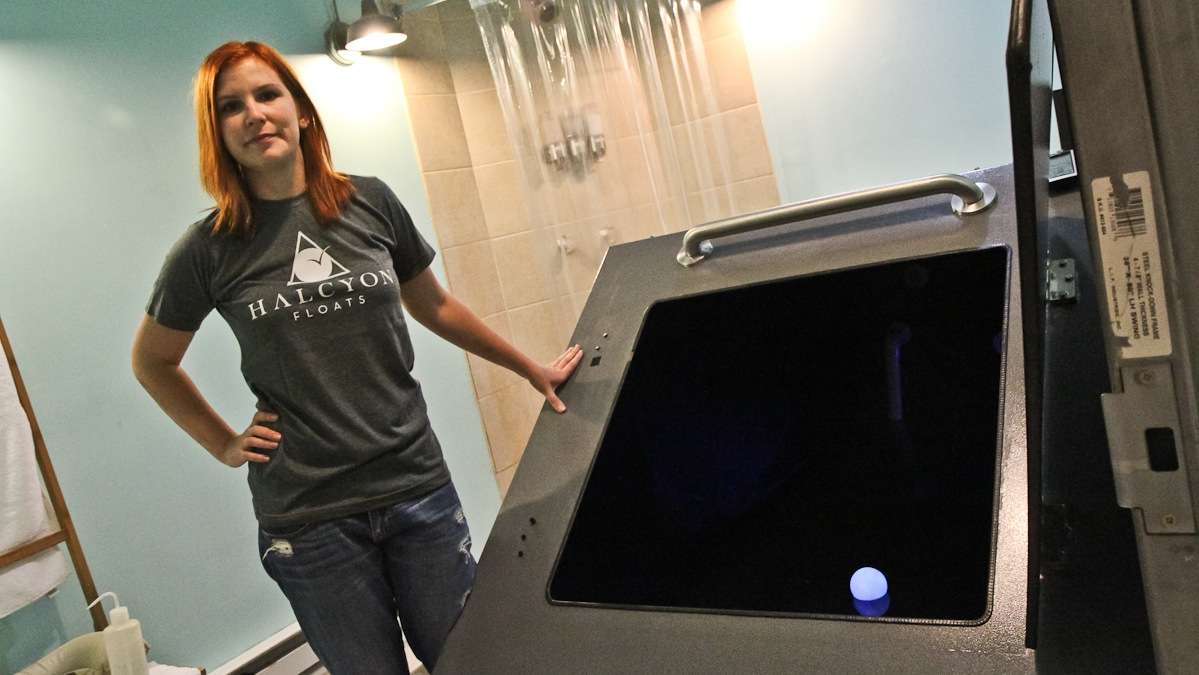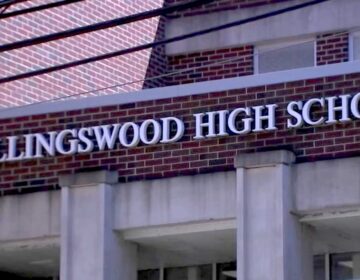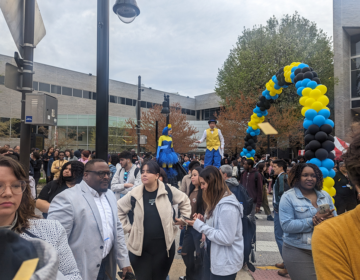Philly schools again rely on first-time principals to overcome budget crisis
Listen“Why on earth would you want to work in the Philadelphia school district?”
It’s the question the leader of city schools has been using to grill principal candidates all summer long.
Wanna-be principals need to prove to Superintendent William Hite not just that they have the chops for the job – but that they aren’t afraid to be held accountable for performance during a budget crisis.
The district has weathered a whirlwind of administrative turnover in the past few years. So Hite has been forced to pose this query many times.
Forty-seven schools will have a new principal this year.
Last year, 58 schools saw changes at the top.
“Those numbers are really pretty startling,” said parent Terrilyn McCormick, whose son has seen four principals in two years at the Creative and Performing Arts High School (CAPA). “To me, it’s just mind-boggling. How could there be any sort of focus on improvement? It just can’t happen with that kind of turnover.”
McCormick says the leadership tumult has created even more instability for students, parents and teachers who have already been dealing with reduced school resources.
At Bartram High that instability contributed to headlines of school violence that rocked the city in late March.
When this school year begins, in a 15 month span, Bartram students will have been placed in the hands of four different principals. One of these four needed the help of an unofficial “co-principal” following a heavily publicized incident in which an unruly student fractured a staffer’s skull.
“A strong leader in a stable position is the best thing,” said McCormick, whose younger son attends Penn-Alexander elementary school, where leadership has been constant since inception. “The teachers know what they’re getting. The families know what they have. The expectations are set.”
In addition to the concerns of parents, rampant turnover also raises questions about the tenability of an education reform movement that, in large part, seeks change through strong, innovative principals who are given the autonomy to build like-minded teams of teachers.
Turnover
The 2013-14 school year featured a particularly large amount of turnover, with 58 schools beginning the year with a different principal.
Of them, 37 were first-time principals.
Of these, 32 will return to the same position this year.
Of the five who won’t: Two have left the district entirely (John Dunphy at CAPA and Brian Shaffer at Solis-Cohen Elementary), two will be principals at different district schools, and one, Ogo Okoye-Johnson, will be on “special assignment” at another district school.
Dunphy resigned from CAPA in October following allegations that he helped students fabricate their course rosters by gifting them credits they didn’t earn.
Okoye-Johnson was removed from Bartram a mere two weeks into her tenure for reasons the district will not disclose. From there she acted as interim principal of Bache-Martin elementary, and this year will be on “special assignment” at E.M. Rhodes elementary.
In a telephone interview, Hite lamented that the high number of principal vacancies last year caused the hiring process to take longer than desired. Many principals weren’t hired until just before classes began.
“We were very late in the process,” said Hite.
Turnover plagued the district in summer 2013 due to a gush of retirements that Hite partly attributed to a fear among principals that separation pay for unused personal and sick time would be eliminated in contract negotiations.
“Last year at this time there was a fear of the unknown,” he said. “Individuals did not want to risk that, so they choose to take advantage of their eligibility to retire.”
In March, the administrators union, CASA, inked a new contract, which retained full separation pay for existing members. New members, though, will receive this benefit at what CASA president Robert McGrogan characterized as a “far lower rate.”
|
Principal retirements |
Principal resignations |
Total departures |
|
|
2012-2013 |
55 |
8 |
63 |
|
2013-2014 |
23 |
22 |
45 |
‘Got it done’
Although admitting missteps, Hite defended the 2013 class of new hires.
“Many districts struggle with retaining principals who are new to that role,” he said. “The fact that 32 of the 37 individuals that we selected a year ago are still here speaks to some of the support that we have put in place for these new principals.”
One of hires that Hite singled out was Gene Jones – an educator who last fall brought 32 years experience in Virginia to George Washington High School in Northeast Philadelphia.
Hite praised Jones for running Norfolk high schools when the district was “acknowledged as one of the highest performing urban school districts in the country.”
Jones says he came to Philadelphia for the challenge, but admits he didn’t truly understand the severity of the funding crisis until he was given the keys to Washington.
The ranks of non-teaching aides had been slashed in half, and his 1,600 students had to share one guidance counselor, two nurses, and no librarian.
He says he urged staff, though, to avoid harping on the cuts and to keep a singular focus on the needs of the students.
“We have to provide a public education for kids,” he said. “I can’t worry about what politicians and policymakers do. What I care about is what happens on this street – that on Bustleton Avenue, every day, for 180 days, we come in and we give our best to everyone of these 1,600 kids who walk in here.”
Despite fewer resources, Jones says Washington improved last school year – citing higher Keystone exam scores (based on preliminary results), and more students earning International Baccalaureate diplomas and passing Advance Placement exams.
Student suspensions went down; teacher attendance rates went up.
“So you take that with some of the cuts that we had,” he said, “we got it done.”
Eyes wide open
When the first bell rings this September, once again many students will find a newcomer behind the principal’s desk.
Hite, though, feels much more confident about this year’s hiring class.
“They’re coming into this role with their eyes wide open,” he said. “They understand the economic challenges.”
For the upcoming school year, 318 applicants vied for 47 positions, all but four of which have been filled.
Among 160 candidates applying from within the district, 33 were selected.
Among 158 candidates applying from outside the district, 10 were selected.
In total, 70 percent of the hires will be first-time principals.
All new hires go through a multifaceted application process. They must impress a school or district based interview team, perform a sample teacher evaluation, and submit a writing sample. Hite then interviews finalists personally.
Principal salaries start at $97,000 and top out at $124,900.
CAPA parent McCormick did not share Hite’s enthusiasm about this year’s applicant pool. As home and school association president, she helped lead CAPAs principal search, where they were specifically seeking a seasoned administrator. Other than the single applicant they selected, whom McCormick likes, she characterized the candidate field as “very weak.”
She wrote to every performing arts high school in the nation to notify administrators of the opening. Many wrote back that they wouldn’t consider Philadelphia without further resource supports.
|
Total Hired
|
First-time principals |
|
|
Internal candidates (160) |
33 |
24 |
|
External candidates (158) |
10 |
9 |
Among the 24 who are first-time principals from within the district:
4 transitioned from interim principal
20 transitioned from teacher, teacher leader or another role.
Among the 9 who are first-time principals from outside the district:
5 transitioned from assistant principal
4 transitioned from teacher leader or another role.
Of the four continuing principal vacancies:
As the search continues, formerly retired district principals will oversee operations at Kensington CAPA and Kensington Business. The district has less than two weeks to find principals for Loesche elementary and Overbrook educational center.
The majority of this year’s new hires are former Philadelphia school district teachers. Hite attributes this to the success of the district’s internal leadership training program as well as PhillyPLUS, another leadership pipeline organized by the Great Schools Compact.
CASA’s McGrogan criticizes the district for filling so many vacancies with first-timers.
“Innovation is the word that’s currently being used, and I’m certain that the people who are accepting these positions are very ambitious,” he said, “but ambition is not a substitute for experience.”
Budget cuts in recent years have thinned the ranks of the district’s assistant principals. McGrogan says 30 remain in layoff status.
“The district is dismissing the talented workforce that has been loyal and allegiant to them for a number of years by looking for people from outside the district or who have no administrative experience in schools,” he said.
Hite stressed that being an assistant principal shouldn’t be a automatic “steppingstone” to the top job.
“This is a skills and abilities conversation,” he said, “and while these individuals are encouraged to compete and apply for these roles, it’s really important that…we actually ensure that they’re able to demonstrate the types of characteristics that we want school-based leaders to have.”
Nothing will come easy for this year’s new school leaders. Schools will have even fewer resources than last year, and if the Pennsylvania legislature doesn’t pass the $2-per pack Philadelphia cigarette tax by mid-September, more staff layoffs are likely.
Despite the district’s ongoing fiscal crisis, school leaders old and new will be judged comparatively to their peers overseeing schools with similar student demographics.
Principals are considered probationary for the first two years on the job. Until then, the district can easily remove them from the position.
“We’re not letting anybody off the hook simply because this is a tough climate,” said Hite. “Our children still need to learn to read. They still need to learn to communicate and write and do math, and so we have to hold people accountable to do that.”
McGrogan says the district’s lack of resources undermines the idea of principal autonomy.
“When you’re broke, you’re not autonomous. You’re bound by what you can afford and then you’re blamed for the decisions that you make,” he said.
Education reformers insist that, in the long run, greater autonomy in the top job will help the district retain the best leaders.
Making the leap
Richard Sherin, 33, arrived in Philadelphia this summer a stranger to the city.
After 12 years of teaching in Maryland, Sherin, a newlywed, wanted to transition to administration. Philadelphia, with its perpetual bounty of openings, looked like the land of opportunity.
“For someone like me it was a no brainer,” he said. “In all honesty, I was either going to stay in Maryland and remain comfortable, or I was going to make the leap and take the principal offer here in Philadelphia.”
For students at The School of the Future, Sherin will be their third principal in as many years.
Sherin believes he can be the one to provide the West Philadelphia school with some needed stability.
“A lack of resources or a budget crunch is not something I’m afraid of,” he said. “What I did want to know more is: How is it affecting the lives of the children?”
Although he admits he’s anxious about the school opening, he’s confident enough in his abilities that he’s flying his parents in to Philadelphia to see his first day of school as a principal.
“Yes, I do have some nervousness,” he said, “but it’s more the anxiety of that calm before the storm.”
Moving the needle
Both Sherin and Gene Jones have connections to Hite and his top leadership team.
Hite and Jones are old friends from when they both became principals in Virginia in the 1990s. Jones, though, says Hite didn’t know he was applying for the Washington High School job “until I walked into his office.”
Sherin is taking the job in part due to the influence of Donyall Dickey, the district’s newly appointed chief academic support officer.
Sherin regards Dickey – who was a principal in Baltimore and Howard Counties in Maryland before becoming an assistant superintendent in Philadelphia in 2013 – as a mentor.
Hite, who was superintendent in Prince Georges County, Md., before arriving in Philadelphia, has culled much of the district’s top talent from the other side of the Mason-Dixon line.
Some critics call this cronyism, a notion Hite dismisses.
“This is not about cronyism. This is about getting individuals into roles that will move the needle on student performance,” said Hite. “We’re looking everywhere for talent. It just so happens that Maryland is a high performing state.”
Richard Sherin hopes his move from Maryland will be permanent.
To him, if you can make it in Philadelphia, you’ve proven you can perform at the pinnacle of your profession.
“After going through this, the only people who are going to be left are the people who are competent, the people who are capable and the people who are dedicated,” said Sherin. “I’m just proud that I get to be one of those people.”
WHYY is your source for fact-based, in-depth journalism and information. As a nonprofit organization, we rely on financial support from readers like you. Please give today.









